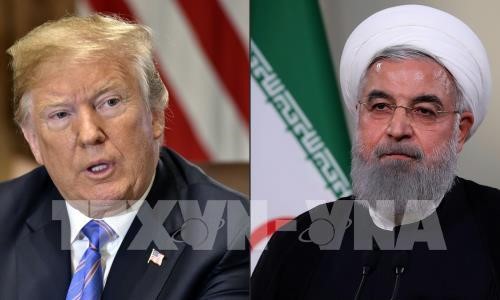(VOVWORLD) - The US and Iran approached the brink of war after Iran shot down a US military surveillance drone above the Strait of Hormuz. Although it stopped short of a military strike against Iran, the US military launched a cyber-attack to disable the computer system that controls Iran’s rocket and missile launchers. President Trump also announced new sanctions against Iran. Reciprocal diplomatic visits have not eased the situation.
 US President Donald Trump and Iran's Supreme Leader Ayatollah Ali Khamenei US President Donald Trump and Iran's Supreme Leader Ayatollah Ali Khamenei |
Since April relations between the US and Iran have soured. Washington has suspended all waivers and banned all petroleum exports from Iran. Tehran has said that if its petroleum exports are obstructed, it will not allow any oil tankers to pass through the Strait of Hormuz.
Attacks on oil tankers in the Gulf of Oman have intensified the US-Iran confrontation. Washington insists that Iran is responsible, while Tehran denies the accusation. On June 20th Iran's Islamic Revolutionary Guard Corps (IRGC) shot down a US military surveillance drone.
Risk of a military conflict
Although both the US and Iran say they don’t want a war, their tough statements and the US’s latest sanctions on Iran signals that a military conflict is a possibility. The US Federal Aviation Administration last Thursday issued an emergency order prohibiting US planes from entering any Iran-controlled airspace over the Strait of Hormuz or the Gulf of Oman. Brigadier General Abolfazl Shekarchi, a senior spokesman for the Iranian military, says any act of aggression against Iran by Washington or its allies will result in heavy costs. Iran will ‘set fire’ to the US and its regional allies, the Brigadier General said.
The international community is looking for a way to ease the situation. The UN Security Council said Tuesday that both sides must step back from a military confrontation, exercise restraint, deescalate tensions, and resolve differences through peaceful measures and dialogues.
On Sunday the UK Minister of State for the Middle East and North Africa, Andrew Murrison, arrived in Iran to talk to the Tehran administration. Iran told Murrison it is not ready to have a dialogue with the US while it is threatening Iran.
“Brink of war” policy very risky
Experts say both the US and Iran are waging a war of nerves to increase pressure on their rival. Trump certainly doesn’t want a war with Iran as his re-election campaign begins. A limited military attack on Iran would provoke Iran’s retaliation, risking another war in the Middle East and great harm to the interests of the US and its allies.
Instability in the Middle East increases the price of crude oil, negatively impacts the global economy, creates opportunities for terrorists, and retards US growth, which is a key factor in the presidential election of 2020.